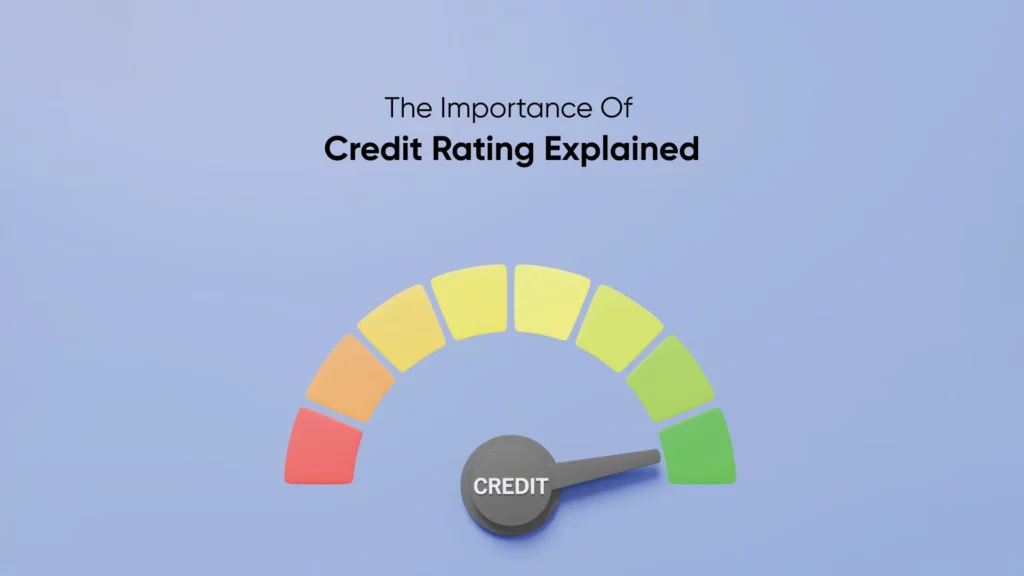What is Credit Rating: Know Its Importance, Types & Benefits

Your creditworthiness is determined in part by your credit rating, which is a crucial tool for assessing your eligibility for financial services and goods. Individuals need to understand the significance of credit scores and how it impacts your loan approval. Let’s talk more in-depth about credit scores in detail:
Table of Contents
ToggleWhat Is a Credit Rating?
A credit rating is a score made by a credit agency that shows how well someone manages their debts. It’s based on things like how they’ve repaid loans in the past and their current financial situation. This score affects whether they can get online credit loans,cards or mortgages, and it also influences the interest rates and terms they’re offered. In simple terms, it’s like a report card for financial responsibility that lenders use to decide if someone is trustworthy enough to lend money to.
Importance of Credit Ratings
Lenders use credit ratings as a report to determine who is most likely to make timely repayments of debt. A person with a good credit score is more likely to make timely loan repayments. Therefore, even with customised offers and favourable interest rates, lenders may still give personal loans to those individuals. A lower credit score could result in higher interest rates for consumers and possibly even the loan being denied by the lender.
Lenders base these kinds of choices heavily on a borrower’s credit score since it makes it simple for them to identify responsible borrowers who will make personal loan repayments on time. Furthermore, borrowers with higher credit scores may receive lower interest rates from lenders than borrowers with lower credit scores.
Factors Influencing Credit Ratings
An individual’s creditworthiness is determined by various factors, including its borrowing history, debt levels, and payment habits. Lenders look at how the borrowers have managed past debts, whether it has paid them back on time, and their current financial position. Financial statements, like balance sheets and income statements, are analysed by lenders to assess the borrower’s overall financial health. The type and amount of existing debt, whether short-term or long-term, also impact credit ratings. These factors, along with others, help lenders evaluate a company’s creditworthiness and assign appropriate credit ratings. To maintain favourable ratings, one must maintain a strong financial record and demonstrate potential for future economic growth.
Benefits of a Good Credit Rating
Several benefits come with having a high credit rating, including easier access to future loan opportunities and favorable terms for loans. The benefits include lower interest rates and bigger credit limits, allowing borrowers to borrow money at lower cost and handle their money better. Furthermore, a high credit score gives lenders confidence in a borrower’s ability to repay loans by demonstrating to them their financial responsibility and dependability. This increases credibility and confidence in turn, providing access to a wider choice of financial services and products.
Types of Credit Ratings
Below listed are a few types of credit ratings:
Individual Credit Rating: Evaluating each customer’s creditworthiness according to their borrowing and repayment history, stability, and other relevant information.
Corporate Credit Rating: Assessing a company’s or business’s creditworthiness by considering its financial standing, amount of debt, and industry dynamics.
Municipal Credit Rating: Rating the creditworthiness of local government entities, such as cities and municipalities, assessing their ability to repay debt and manage finances.
Short-Term and Long-Term Credit Rating: Distinguishing between short-term and long-term creditworthiness, with short-term ratings focusing on immediate debt repayment capacity and long-term ratings assessing overall financial stability and creditworthiness.
Structured Finance Credit Rating: Rating financial products and instruments that are backed by pools of assets, such as mortgage-backed securities or collateralized debt obligations, to evaluate credit risk and investment potential.
How Credit Ratings Impact Financial Decisions
Both lenders and borrowers make significant financial decisions based on credit scores. Having strong credit makes it simpler for consumers to apply for credit cards and loans. They also benefit from lower loan rates, which helps them save money over time. However, a poor credit score may result in loan denials or higher interest rates, which would increase the cost of borrowing. Keeping a check on Credit ratings helps lenders since they choose who to lend money to and at what interest rate. They are more inclined to accept loans and give cheaper rates to borrowers with high credit scores because they perceive them as less dangerous. However, lenders may be more cautious and impose higher interest rates to cover loans made to individuals with bad credit ratings. In general, credit ratings have a significant impact on financial decisions, influencing anything from interest rates to loan approvals.
How to Improve Your Credit Rating
Maintaining a healthy credit score involves certain proactive strategies. Firstly, prioritize timely payment of all bills, including credit card bills, loan installments, and utility bills, to avoid negative marks on your credit report. Keeping credit card balances low relative to your credit limit is equally important, as high credit card utilization can adversely impact your credit score. Additionally, be cautious about applying for multiple credit accounts, as each application generates a hard inquiry on your credit report, potentially lowering your score temporarily. Diversifying your credit mix by having a variety of credit types, such as credit cards, loans, and mortgages, can positively influence your creditworthiness. Lastly, if you have a limited credit history or a low credit score, consider exploring credit-building options like credit builder loans or secured credit cards, specifically designed to help individuals establish or rebuild credit. By sticking to these strategies, individuals can steadily improve credit score and enhance their financial health.
Common Misconceptions About Credit Ratings
There are several common misconceptions about credit ratings that need to be clarified. Many believe that checking their credit record will lower their score, but this is untrue. Others believe that keeping a small balance on their credit cards is good for their score, but paying off the balance in full each month is better. There’s also another misconception that a person’s income level impacts their credit score when in reality, credit scores are solely determined by a person’s credit history and credit behavior.
Top Credit Rating Agencies in India
In India, several credit rating agencies play a significant role in assessing the creditworthiness of individuals, businesses, and financial instruments. Some of the top credit rating agencies in India include:
Credit Rating Information Services of India Limited (CRISIL): CRISIL is one of the leading credit rating agencies in India, providing ratings for various entities, including corporations, banks, financial instruments, and government securities.
ICRA Limited: ICRA is another prominent credit rating agency in India, offering credit ratings and research services across various sectors, including corporations, financial institutions, and infrastructure projects.
CARE Ratings: CARE Ratings is known for its comprehensive credit rating services, covering a wide range of entities and sectors, including corporates, SMEs, infrastructure, and public finance.
India Ratings and Research Private Limited (Ind-Ra): Ind-Ra is a subsidiary of Fitch Ratings, offering credit ratings and research services for corporates, financial institutions, and structured finance products.
Brickwork Ratings India Private Limited: Brickwork Ratings is a relatively newer credit rating agency in India, providing ratings for corporations, banks, and financial instruments.
Also Read: The Dos and Don’ts of Personal Finance Planning
Conclusion
In conclusion, credit rating is crucial when making financial decisions for both individuals and companies. It determines interest rates, loan terms, and credit availability. Understanding its importance helps individuals to manage their finances responsibly and open doors for better financial opportunities.
Frequently Asked Questions
How Does Credit Rating Help?
Credit rating assists individuals and businesses in assessing their creditworthiness, determining eligibility for loans and credit cards, and securing favorable terms and interest rates based on their financial history and behavior.
What Is The Credit Rating Process?
The credit rating process involves evaluating an individual’s or business’s financial records, including payment history, debt levels, and credit utilization, to assign a numerical score representing their creditworthiness.
Why Is Credit Rating Good?
A good credit rating is advantageous as it enables individuals and businesses to access credit easily, secure loans at favorable terms and interest rates, and demonstrate financial responsibility to lenders.
Is Credit Rating Mandatory In India?
While credit rating is not mandatory in India, it significantly influences access to credit, loan terms, and interest rates, playing a crucial role in financial transactions and decisions.
Which Credit Rating Is Most Important?
The most important credit rating varies depending on the context, such as personal finance (CIBIL score) or business finance (CRISIL rating), each serving different purposes in assessing creditworthiness.
How Often Should I Check My Credit Rating, And How Can I Improve It If It's Low?
Regularly monitoring your credit rating is advisable, at least once a year, to detect any errors or fraudulent activity and take steps to improve it, such as paying bills on time, reducing debt, and maintaining a low credit utilization ratio.
Can A Poor Credit Rating Affect My Ability To Get Loans Or Credit Cards?
Yes, a poor credit rating can significantly impact your ability to qualify for loans or credit cards, as lenders may perceive you as high-risk and offer less favorable terms or deny credit altogether.
How Does Having A Good Credit Rating Benefit Me In The Long Term, Beyond Just Accessing Credit?
Beyond accessing credit, a good credit rating can lead to lower interest rates on loans, better insurance premiums, increased chances of rental approval, etc.
Can I Still Get A Loan If I Have No Credit History Or A Limited Credit Rating?
Yes, individuals with no credit history or limited credit rating can still qualify for loans, though they may face challenges and may need to explore alternative options such as secured loans or having a co-signer.
Is There A Difference Between Credit Score And Credit Rating?
Yes, credit score and credit rating are often used interchangeably, but they have distinct meanings. A credit score is a numerical representation of creditworthiness, whereas a credit rating evaluates credit risk based on a broader assessment of financial history and behavior.
YOU MAY ALSO LIKE






Search by posts
Recent post
-
 15 Best Scooties in India for 2025: Features, Prices, and Reviews
15 Best Scooties in India for 2025: Features, Prices, and Reviews
-
 What is Mutual Fund’s Risk: 6 Ways to Measure a Mutual Fund’s Risk?
What is Mutual Fund’s Risk: 6 Ways to Measure a Mutual Fund’s Risk?
-
 How to Calculate Interest And Principal Amount in EMI?
How to Calculate Interest And Principal Amount in EMI?
-
 What is personal loan settlement? How Its Effects on Your Credit Score
What is personal loan settlement? How Its Effects on Your Credit Score
-
 Loan Sharks: What is it, Risks, and Prevention Tips
Loan Sharks: What is it, Risks, and Prevention Tips
Categories
- Blog (2)
- Credit History (27)
- Credit Line (7)
- Festive (3)
- Finance (15)
- Mutual Fund (12)
- Personal Loan (244)
- Tax (8)
- Zype (4)








